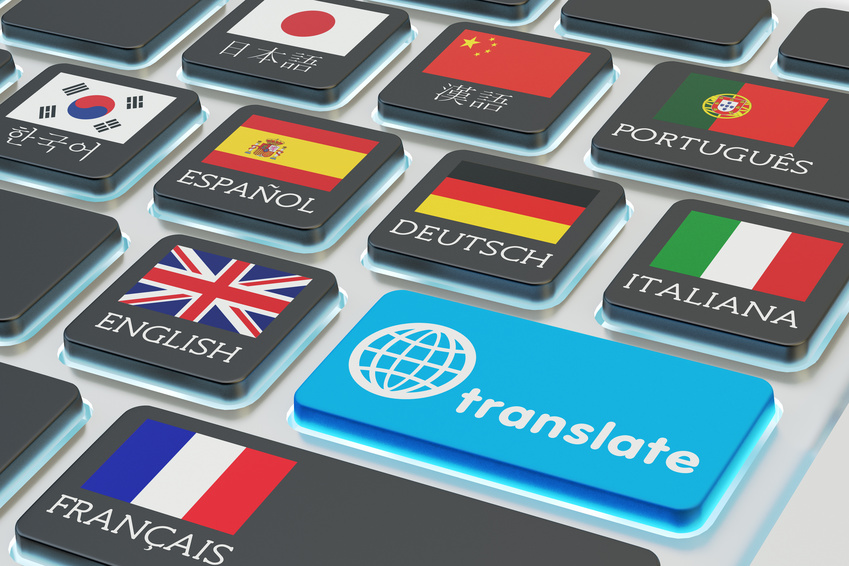In the recent years, translation services have become an important element of people’s everyday lives around the world. Today, we are able to connect with one another within seconds regardless of our location, and thanks to real-time translation providers such as Google Translate, we can successfully communicate with different people, even if we don’t speak the same language.
Whether it’s contacting friends or family, discovering a new movie or asking for directions during an overseas escapade, the widespread availability of instant and accurate translation and interpreting has truly made our lives much easier.
Translations, however, leave a mark not only on our every-day lives, but can also directly affect the way companies conduct business and approach international markets and customers. With developments in technology and artificial intelligence (AI), businesses are now able to trade across boarders without the need of a physical presence in the target market; and language translations play an important, if not crucial, part during this process.
How to choose a translation provider?
When it comes to choosing the right translations provider for your business, there are quite a few different approaches you might consider exploring. Each of them has its very own advantages as well as drawbacks, and so we’ll take a closer look at them individually. In this article, we’ll aim to explain in more detail the following options:
- In-house linguists
- Translation Services Agency
- Free Software
- Freelance translators
In-House linguists
Working with in-house linguists was a popular approach to the corporate translations in the past, and as methods changed, it has recently become quite an uncommon occurrence amongst UK based businesses to employ full-time translation experts who would work within their offices. Even some of the largest law firms, which used to take pride in having on-site linguists, have now changed their attitude towards language translations.
The main advantage of working with an in-house linguist is their ability to express company’s message extremely accurately, as they will naturally understand the company’s culture and what the brand truly represents. A translator who is a full-time employee of a company would not only reliably convey the message into the target language but will also be able to create entirely new content which reflects your company’s values, directly in the market’s native language.
The biggest downside of this solution and perhaps the main reason why majority of companies have now rejected this approach – are costs. Employing a full-time linguist requires companies to budget in their salary and other relevant expenses. Of course, usually, a linguist is able to cover only one language and as a result, for international companies trading in number of different languages, it is simply uneconomical to employ several full-time linguists. Additionally, this solution heavily limits the turnaround times of a translation as your content would have to be translated by a single linguist, rather than a team of professional translators who are able to collaborate together – which is actually a great advantage of the second approach, described below.
Translation Services Agencies
As working with in-house linguists is slowly becoming a thing of the past, a new – more modern and budget friendly approach takes its place. Statistics show, that a rapidly growing number of UK based businesses decide to partner directly with professional translation agencies, which allows them to overcome all of the drawbacks mentioned before, at fraction of the cost.
Usually, agencies which specialize in translating corporate and business content cover a number of different languages and are able to do so within reasonable timelines. This is a truly great advantage within a competitive business world and business owners now begin to fully appreciate the benefits of working with professional language service providers.
In the United Kingdom, there are several translation service agencies, such as ‘Lingo-Experts’, ‘London Translations’, ‘Language Reach’ or ‘Adept Translations UK’ which focus mainly on working with business clients. Most of such companies provide translations completed by native speakers of the target language, which guarantees high accuracy and cultural suitability. A further benefit of working directly with a professional translation services agency is that you, or your business, will be able to make use of additional language services, such as interpreting or localization all sourced from the same provider which already knows your brand and preferred style – which can be extremely useful during an internationalization process.
Some of the leading translation agencies also offer very competitive rates for long term customers based on ‘translation memory’. TM is a specialized software, which allows the service provider to compare different documents and materials you have converted with them overtime, and if any of the content is similar to what you’ve already translated, often a reduced rate would be applied. Another great benefit of the TM software is that it ensures that your translations are consistent by applying the same linguistic solutions throughout all materials, which can be extremely beneficial for your branding and company image.
Free Translation Software
The developments in language software technology and Artificial Intelligence over the last decade are truly astonishing. One of the market leaders, Google, is now able to accurately translate majority of languages – and not only simple phrases or words, but often complex sentences, slogans or idioms.
Although free translation software solutions are getting more and more reliable, they are still recommended for personal use, such as contacting friends or family who do not speak the same language. They can also be perfect as an instant interpreting tool abroad.
A native speaker of your target language will be able to translate your content accurately, and at the same time, ensure that it is reliable – not only linguistically, but also culturally and socially. Especially for marketing or business materials, cultural factors can be very significant when translating a corporate message.
Freelance Translators
Working with freelance translators is a perfect mix of employing a full-time linguist and working with an expert translation agency. Freelance translators are able to convey your message into the target language accurately (bearing in mind the cultural factors) without breaking your company’s budget.
Nonetheless – the biggest drawback of this approach is just how time-consuming it often can be to find reliable linguist who is not only a native speaker of your target language, but who also specializes in translations for your particular business sector.
Translating marketing materials takes a completely different set of skills than translating, for example, legal documents. A person who converts your content must be able to understand specific jargon, lingo or technical terms which are particular for your company and sector. Additionally, as freelance linguists are not full-time employees of your company, even though you find a reliable provider, they might take on other assignments and become unavailable when you require a translation yourself.
All things consider – what’s best for me?
Choosing the best method of translating your content really depends on your individual circumstances and requirements. Each of the options described above has their own set of drawbacks and benefits, also based on your situation. When deciding on the best way to approach translating your company’s materials and documents, you should consider both external and internal factors, such as the size of your organization, potential budget, time limitations as well as main aim of the translation, target market/audience or number of languages required. Each of these factors can, and perhaps should, directly influence your choice.
Employing a full-time linguist who would work within your company can be somewhat expensive in the long term, especially if you need to translate your materials into several languages, but, at the same time, it allows the linguist to fully understand your company’s culture and what is expected from the translation.
Freelance linguists, although a slightly cheaper option than working with a professional agency, do not always guarantee similar levels of accuracy and can be a very time-consuming choice. Translation agencies, on the other hand, guarantee linguistic and cultural accuracy and fast turnaround times, which can be very important within a competitive market. An additional benefit of working with a translation agency, unique to this solution, is the fact that you’ll be able to make use of further language services should a need for them arise. From interpreting to localization or transcreation –a translation company can cover a variety of different language services.

